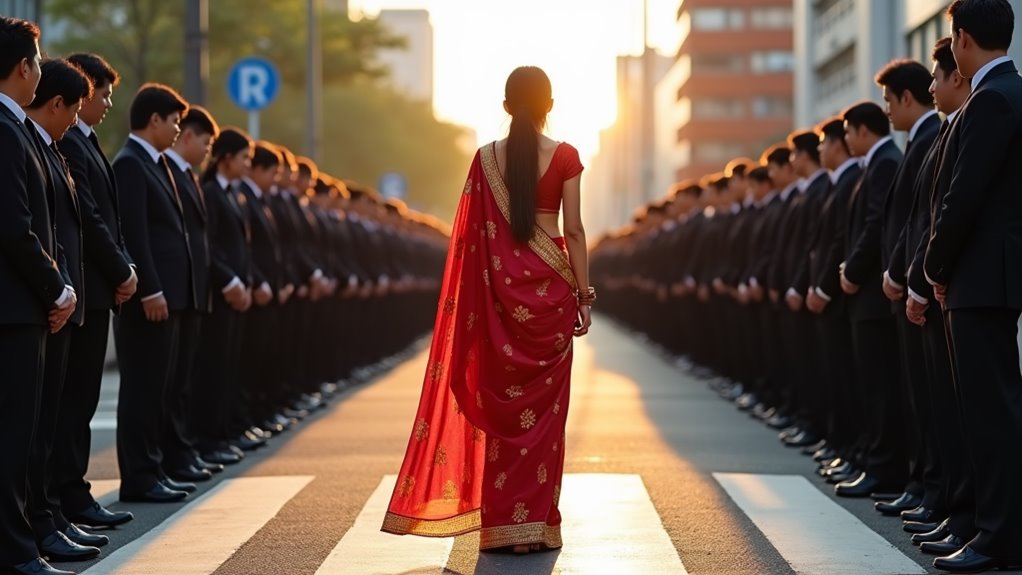When traveling abroad, you'll want to strike a balance between respecting local customs and staying true to yourself. Start by researching basic cultural norms like greetings, dress codes, and dining etiquette for your destination. Pay attention to religious practices, gender expectations, and social hierarchies to avoid unintentional offense. Mirror locals' behavior for body language and personal space, but don't feel pressured to participate in activities that violate your personal values. Learn key phrases, dress appropriately, and show sincere interest in local traditions. Your thoughtful approach to cultural differences will open doors to deeper, more meaningful travel experiences.
Key Takeaways
- Research and adopt local dress codes to show respect, but maintain authenticity without completely abandoning your personal style.
- Mirror local customs and body language while being mindful of cultural nuances in greetings and social interactions.
- Learn basic phrases in the local language and observe communication styles to facilitate meaningful connections without appearing overly formal.
- Respect religious practices and cultural traditions while being honest about your own boundaries and limitations.
- Blend in through cultural awareness but embrace being a foreigner when appropriate, using it as an opportunity for cultural exchange.
Cultural Research Before You Go

Before embarking on international travel, researching your destination's cultural norms can prevent embarrassing social mistakes and show respect for local customs.
Start by exploring basic elements like traditional greetings, dining etiquette, appropriate dress codes, and common gestures that might've different meanings abroad.
You'll want to understand religious practices, gender roles, and social hierarchies that influence daily interactions.
Look into specific taboos or sensitive topics to avoid in conversation. Learn a few basic phrases in the local language, even if English is widely spoken.
It's also helpful to research business customs if you're traveling for work.
Consider consulting travel blogs, cultural guides, and locals through online forums.
Understanding these nuances will help you navigate social situations confidently and demonstrate cultural sensitivity during your travels.
Dress Code Decisions
When traveling abroad, appropriate dress choices can make or break your cultural experience. Research local customs to understand what's considered respectful attire. In many religious sites, you'll need to cover your shoulders and knees, while some mosques require women to cover their hair.
Pack versatile pieces that align with local standards while keeping you comfortable. You'll want to avoid clothing that's too revealing, politically charged, or flashy in conservative regions.
Consider the season and typical activities you'll be doing. In business settings, err on the formal side until you understand the workplace culture.
Remember that what's perfectly acceptable at home might draw unwanted attention elsewhere. When in doubt, observe what locals wear and adjust accordingly.
Body Language Across Borders

Just as spoken language varies worldwide, body language carries different meanings across cultures.
What's perfectly acceptable in your home country might be offensive elsewhere. You'll need to research and adapt your gestures and expressions before traveling.
In some cultures, direct eye contact shows respect, while in others, it's confrontational. The "thumbs up" gesture you use to signal approval could be vulgar in parts of the Middle East and Latin America.
Even your natural sitting position matters – showing the soles of your feet is deeply offensive in many Asian countries.
When greeting others, consider that while Americans typically shake hands, Japanese bow, and Mediterranean cultures might kiss on the cheek.
Learning these unspoken rules will help you navigate social situations and avoid unintentional offense during your travels.
Local Customs Versus Personal Values
When traveling abroad, you'll often encounter cultural practices that challenge your personal beliefs and comfort zone.
You can show respect for local customs while still maintaining your core values by finding creative compromises, like participating in traditional ceremonies without consuming items that violate your principles.
If a custom seriously conflicts with your fundamental values, it's acceptable to politely decline participation while expressing appreciation for being included.
Balancing Cultural Respect
Although respecting local customs is crucial while traveling abroad, you'll often face situations where cultural practices conflict with your personal values. When this happens, you'll need to decide whether to adapt or maintain your stance.
Consider the impact of your choices on both local sensibilities and your own integrity. You can often find middle ground by participating in harmless traditions while politely declining those that cross your ethical boundaries.
For instance, you might wear modest clothing in conservative areas but skip activities that discriminate against certain groups. If you must decline participation, do so gracefully and without judgment.
Remember that you're a guest in someone else's home, but that doesn't mean you must compromise your core beliefs.
When Values Clash Abroad
Navigating cultural clashes requires practical strategies to handle uncomfortable situations. When your personal values conflict with local customs, you'll need to decide whether to adapt or respectfully decline participation.
Consider the context: Is the custom harmful, or just different from what you're used to? You can often find middle ground by understanding the intent behind traditions while maintaining your core principles.
If you encounter practices that cross your ethical boundaries, it's okay to excuse yourself politely. Try phrases like "I appreciate you sharing your tradition with me" or "I hope you'll understand that I need to abstain."
Remember that you can respect a culture without embracing every aspect of it. Focus on building bridges through shared values while being honest about your limitations.
Religious and Spiritual Considerations

Since religious customs shape daily life in many countries, you'll need to understand and respect local spiritual practices during your travels.
Research whether you'll need to cover your head in places of worship, remove your shoes before entering temples, or dress modestly in conservative regions. Pay attention to prayer times and religious holidays that might affect business hours or public behavior.
Be mindful of religious dietary restrictions when dining with locals or in certain areas. Don't photograph religious ceremonies without permission, and maintain appropriate behavior at sacred sites.
If you're invited to participate in religious activities, ask about proper etiquette beforehand. Remember that some gestures or actions you consider normal might be offensive in religious contexts, so stay observant and follow local cues.
Food Etiquette and Dietary Choices
Food plays a central role in cultural exchange, much like religious practices. When you're dining abroad, you'll need to understand local customs to avoid unintentionally offending your hosts.
In many Middle Eastern countries, eating with your left hand is considered unclean, while in Japan, sticking chopsticks vertically in rice resembles funeral rituals.
You'll want to research dietary restrictions and meal etiquette before traveling. Some cultures consider refusing food impolite, while others expect you to leave a bit on your plate to show satisfaction.
If you have dietary restrictions, learn to communicate them respectfully in the local language. Consider carrying translation cards explaining your needs, and research local dishes that align with your dietary requirements to demonstrate cultural interest while maintaining your preferences.
Business Meeting Protocol

When you're conducting business abroad, you'll encounter diverse expectations about meeting protocols that can significantly impact your success.
Understanding local customs about punctuality, whether it's arriving exactly on time in Germany or planning for a more relaxed schedule in Latin America, will help you navigate these professional interactions smoothly.
The way you greet colleagues and your approach to business gift-giving are equally important aspects of international business etiquette that vary widely across cultures.
Meeting Times and Punctuality
Although business meeting customs vary worldwide, punctuality expectations can make or break your professional relationships abroad. In Germany and Switzerland, you'll want to arrive at least 5-10 minutes early, as tardiness is considered disrespectful.
Japanese business culture also values precise timing, so plan to arrive before the scheduled time.
In contrast, you'll find more flexible attitudes in Latin American and Mediterranean countries. In Brazil or Spain, arriving 15-30 minutes late might be normal and even expected.
Middle Eastern countries often take a relaxed approach to meeting times, where relationships and conversation take precedence over strict schedules.
To navigate these differences successfully, research local customs beforehand and adjust your timing accordingly. When in doubt, it's better to arrive early and wait than to risk appearing discourteous.
Proper Greetings and Gestures
Professional greetings vary dramatically across cultures and can impact the success of your business meetings. In Japan, you'll need to bow slightly and exchange business cards with both hands.
Middle Eastern cultures often require same-gender greetings, while maintaining eye contact during conversations. In Latin America, expect warm handshakes and close physical proximity.
Don't assume a handshake is always appropriate. Some cultures consider certain hand gestures offensive, like the thumbs-up signal in parts of the Middle East.
In many Asian countries, pointing with your finger is considered rude – use your entire hand instead. When in doubt, observe your hosts and mirror their actions.
You'll also want to research specific customs for the country you're visiting, as regional variations exist even within the same culture.
Gift-Giving Business Customs
Beyond proper greetings, gifting plays a significant role in global business relationships. In Japan, you'll need to present gifts with both hands and expect your host to refuse them two or three times before accepting.
Don't be surprised if they don't open your gift immediately, as this is considered polite.
When doing business in China, avoid giving clocks or white flowers, as they're associated with death. In the Middle East, don't gift alcohol or products containing pork.
For South Korean partners, the number 4 is unlucky, so don't give gifts in sets of four. Always research local customs before selecting business gifts, and remember that in some countries, like Singapore, strict regulations exist about giving gifts to government officials to prevent corruption.
Social Media and Photography Rules
When traveling abroad, social media posts and photos can quickly become cultural landmines if you're not careful.
Research local photography restrictions before your trip, as many religious sites, government buildings, and cultural landmarks prohibit pictures. In some countries, you'll need explicit permission to photograph people, especially children.
Be mindful of your social media sharing habits too. What's acceptable in your home country might offend locals elsewhere.
Avoid posting photos of religious ceremonies, military installations, or politically sensitive locations. Remember that hand gestures and poses that seem innocent to you could be offensive in other cultures.
When in doubt, wait to post until you've consulted a local guide or trusted resident about what's appropriate to share online.
Making Cultural Mistakes Gracefully

Even the most prepared travelers make cultural missteps abroad, and how you handle these moments matters more than the mistakes themselves.
When you commit a faux pas, respond with sincere apology, humility, and a willingness to learn. Don't become defensive or dismiss local customs as unreasonable.
If you've offended someone, acknowledge your mistake immediately and ask about the proper way to handle the situation.
Simple phrases like "I'm sorry, I didn't know" in the local language can help ease tension. Many locals will appreciate your effort to understand their culture and may even share additional insights about their traditions.
Remember that cultural mistakes can become valuable learning opportunities that deepen your understanding of the place you're visiting.
Frequently Asked Questions
How Do I Respectfully Decline Gifts Without Offending My International Hosts?
To decline gifts respectfully, you'll want to express genuine gratitude first, then explain your limitations politely.
If it's due to travel restrictions, mention that you can't fit items in your luggage. If it's cultural or personal, share a brief, honest reason.
You can also suggest an alternative, like sharing a meal together or taking a photo to remember the moment.
What Should I Do if I Accidentally Break a Cultural Taboo?
Imagine you've unknowingly pointed at someone with your left hand in Malaysia, considered disrespectful in their culture. When you realize you've broken a taboo, immediately apologize sincerely and explain that you weren't aware of the custom.
Don't overreact or become defensive – instead, use it as a learning opportunity. Ask locals about the proper way to handle the situation, and show genuine interest in understanding their cultural norms better.
When Is It Appropriate to Discuss Politics With Locals Abroad?
You'll want to be cautious when discussing politics abroad.
Wait until you've established a genuine rapport with locals and they bring up political topics first.
Pay attention to social cues and the setting – casual conversations at cafes or social gatherings are often more appropriate than formal situations.
Keep your tone curious and respectful, avoid making comparisons, and be ready to listen more than speak.
Should I Learn Basic Greetings in Multiple Local Dialects?
Learning basic greetings in local dialects is a valuable effort that'll show respect and genuine interest.
You'll want to focus on the most widely used dialect first, but knowing variations can help you connect with different communities.
While you don't need to master them all, simple greetings like "hello," "thank you," and "goodbye" in various dialects will often earn you goodwill and appreciation from locals.
How Do I Handle Unexpected Physical Contact in Greeting Situations?
Stay calm, stay composed, and stay respectful when unexpected physical contact occurs during greetings.
If you're caught off-guard by a hug, kiss, or bow, simply mirror the other person's actions while maintaining a pleasant demeanor.
You'll want to observe locals beforehand to understand typical greeting customs, but when surprised, just go with the flow and remember that what feels foreign to you is natural to them.
Conclusion
Studies show that 95% of travelers who research cultural norms before their trips report more positive interactions with locals. You'll find that being culturally aware doesn't mean completely sacrificing your identity – it's about finding the right balance. Whether you choose to blend in or respectfully stand out, your effort to understand local customs will open doors to authentic experiences and meaningful connections abroad.

Leave a Reply